
| Version | Summary | Created by | Modification | Content Size | Created at | Operation |
|---|---|---|---|---|---|---|
| 1 | Beatrix Zheng | -- | 2188 | 2022-11-10 01:46:56 |
Video Upload Options
A Parliamentary train is a passenger service operated in the United Kingdom to comply with the Railway Regulation Act 1844 that required train companies to provide inexpensive and basic rail transport for less affluent passengers. The act required that at least one such service per day be run on every railway route in the UK. Now no longer a legal requirement (although most franchise agreements require such trains), the term describes train services that continue to be run to avoid the cost of formal closure of a route or station but with reduced services often to just one train per week and without specially low prices. Such services are often called "ghost trains".
1. Nineteenth-century Usage
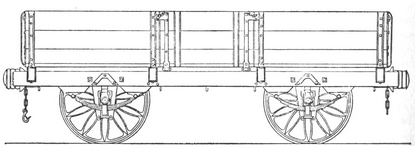
In the earliest days of passenger railways in the United Kingdom the poor were encouraged to travel in order to find employment in the growing industrial centres, but trains were generally unaffordable to them except in the most basic of open wagons, in many cases attached to goods trains.[1] Political pressure caused the Board of Trade to investigate, and Sir Robert Peel's Conservative government enacted the Railway Regulation Act 1844, which took effect on 1 November 1844. It compelled "the provision of at least one train a day each way at a speed of not less than 12 miles an hour including stops, which were to be made at all stations, and of carriages protected from the weather and provided with seats; for all which luxuries not more than a penny a mile might be charged".[2]
1.1. In Popular Culture
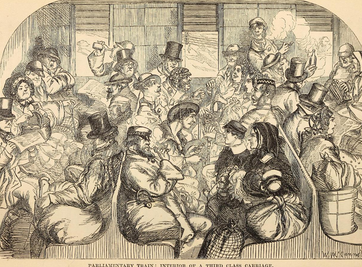
The basic comfort and slow progress of Victorian parliamentary trains led to a humorous reference in Gilbert and Sullivan's comic opera The Mikado. The Mikado is explaining how he will match punishments to the crimes committed:
The idiot who, in railway carriages
Scribbles on window-panes
We only suffer
To ride on a buffer
On Parliamentary trains.
2. Legacy of the Beeching Cuts
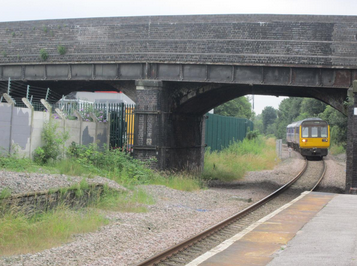
In 1963 under its chairman Richard Beeching, British Railways produced The Reshaping of British Railways report, designed to stem the huge losses being incurred as patronage declined.[3] It proposed very substantial cuts to the network and to train services, with many lines closed under a programme that came to be known as the Beeching cuts. The Transport Act 1962 included a formal closure process allowing for objections to closures on the basis of hardship to passengers if their service was closed. As the objections gained momentum, this process became increasingly difficult to implement, and from about 1970 closures slowed to a trickle.
In certain cases where there was exceptionally low usage the train service was reduced to a bare minimum, but the service was not formally closed, avoiding the costs associated with closure. In some cases the service was reduced to one train a week, and in one direction only.
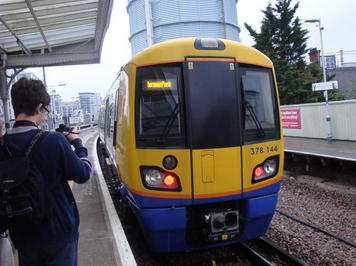
These minimal services had resonances of the 19th-century parliamentary services, and among rail enthusiasts they came to be referred to as "parliamentary trains", or more colloquially "parly" trains (following the abbreviation used in Victorian timetables) or "ghost trains". However, this terminology has no official standing. So-called parliamentary services are also typically run at inconvenient times, often very early in the morning, very late at night, or in the middle of the day at the weekend. In extreme instances, rail services have actually been "temporarily" withdrawn and replaced by substitute bus services, to maintain the pretence that the service has not been withdrawn.
2.1. Speller Act
When the closures brought about by the Beeching Report had reached equilibrium it was recognised that some incremental services or station reopenings were desirable. However, if a service was started and proved unsuccessful, it could not be closed again without going through the formal process, with the possibility that it might not be terminated. It was recognised that this discouraged possible desirable developments, and the Transport Act 1962 (Amendment) Act 1981 permitted the immediate closure of such experimental reopenings. The Bill that led to the Act of 1981 was sponsored by a pro-railways Member of Parliament, Tony Speller, and it is usually referred to as the Speller Act. The process is still in effect, although the legislation has been subsumed into other enactments.
3. Services
3.1. Current
Examples of lines in the December 2019 - May 2020 timetable served only by a parliamentary train are:
| Origin | Destination | Days operated | Outbound departure |
Return departure |
Operator | Comments |
|---|---|---|---|---|---|---|
| South Ruislip | West Ealing | Monday-Friday | 10:55[4] | 11:47 to High Wycombe[5] | Chiltern Railways | Via the Greenford line, commenced 10 December 2018 replacing previous service to London Paddington via the Acton-Northolt line. |
| Filton Abbey Wood | Bath Spa | Mondays - Fridays | 16:03 | N/A | Great Western Railway | Via Bristol West Curve. Only public service to use the curve. |
| Norwich | Manchester | Sundays | 15:54 | N/A | East Midlands Railway | Only public service to use the Queen Adelaide loop, north of Ely. |
| Battersea Park | Dalston Junction
Highbury & Islington |
Monday-Friday
|
06:33 23:03 07:26 |
22:04
N/A |
London Overground | Commenced 9 December 2012 after Southern service between London Victoria and London Bridge via the South London line ceased. |
| Liverpool Street | Enfield Town | Saturday | 05:30 | N/A | London Overground | Travels via but does not call at South Tottenham. Has not run via booked route since 21st August 2018, and looks unlikely to resume soon.[6] |
| Lancaster | Morecambe | Monday–Saturday | 05:30 | N/A | Northern | Via Carnforth (reverse) and the Morecambe to Hest Bank line. |
| Lancaster | Heysham Port | Monday - Friday | 12:49 | 13:20 | Northern | Daily service between Morecambe and Heysham Port. |
| Goole | Leeds | Monday-Saturday | 07:42 19:44 |
17:58 | Northern | Via the Pontefract line. |
| Sheffield | Cleethorpes | Saturday | 07:55 11:56 15:55 |
11:12 15:09 19:15 |
Northern | Via Kirton Lindsey & Brigg, became a parliamentary service when weekday services were withdrawn in 1993.[7] Regular trains now operate between Gainsborough and Sheffield. |
| Stalybridge | Stockport | Saturday | 10:13 | 10:43 | Northern | Via Stockport to Stalybridge Line. |
| London Charing Cross | Tunbridge Wells | Tuesday-Saturday | 00:15 (ThFSSuO) | 04:45 (SSuX) | Southeastern | These journeys use the curve between Beckenham Junction and New Beckenham (previously used by a weekday morning Cannon Street to Beckenham Junction via New Beckenham train, returning in the afternoon to Charing Cross). |
| Gillingham
London Victoria |
Sheerness-on-Sea | Monday-Friday | 04:56
18:12 |
N/A
07:00 |
Southeastern | Travel via Sittingbourne West Junction curve. Also used by Sheerness - London Victoria services. |
| Streatham Hill | London Bridge | Monday-Friday | 16:17 | N/A | Southern | Via Tulse Hill and Leigham Junction. |
| Wolverhampton | Rugeley Trent Valley | Saturday | 05:42 | N/A | West Midlands Trains | Only service to go directly between Wolverhampton and Walsall, between Darlaston Jn and Pleck Jn. Other services use the line between Crane Street Jn and Portobello Jn. |
| London Victoria | Ashford International | Monday-Friday | 05:50[8] | N/A | Southeastern | Via "Factory Junction", "Stewarts Lane Junction" and "Grosvenor Bridge Junction", calling at Wandsworth Road and Clapham High Street, this is the only Southeastern service to call at these stations. |
3.2. Former
Examples of lines formerly served only by a Parliamentary train are:
| Origin | Destination | Days operated | Outbound departure |
Return departure |
Operator | Ceased | Comments |
|---|---|---|---|---|---|---|---|
| Chester | Runcorn | Summer Saturdays | 07:53 | N/A | Northern | 8 September 2018 | Via the one-way Halton Curve, northbound only.[9][10] Last ran 2018, full-time services resumed in May 2019[11] |
| Woodgrange Park | Willesden Junction | Monday-Friday | 07:59 | N/A | London Overground | Some time in 2018 | This service travelled via but did not call at Gospel Oak. Last operated mid to late 2018. |
| South Ruislip | London Paddington | Monday-Friday | 10:57[12] | 11:35 to High Wycombe[13] | Chiltern Railways | 7 December 2018 | Maintained route knowledge for drivers enabling services to divert to Paddington when Marylebone was closed, ceased 7 December 2018 with the closure of the Acton-Northolt line services to enable High Speed 2 works. The service was diverted to West Ealing via the Greenford line. |
| Gerrards Cross | London Paddington | Monday - Friday | 10:44 | 11:36 (to West Ruislip after 14th May 2012) | Chiltern Railways | Late 2012 | Began at South Ruislip from late 2012, and continued operating to West Ruislip for the duration of the timetable. Started operating South Ruislip - Paddington - High Wycombe at some point in 2017. |
| Kensington Olympia | Wandsworth Road | Monday - Friday | 10:02 | 16:11 (from Clapham High Street) | Southern | 17 June 2013 | Ceased when London Overground began operations to Clapham Junction. The main route between Latchmere No. 1 Jn and Longhedge Jn never regained passenger use, except for use by excursions on occasion. |
| Newcastle | Nunthorpe | Monday - Saturday | 06:00 | N/A | Northern | Unknown | Via single-line curve between King Edward North Junction and Gateshead Park Lane Jn. Has not regained passenger use since. |
4. Stations with Minimal Services
A station may have a parliamentary service because the operating company wishes it closed, but the line is in regular use (most trains pass straight through). Examples include:
- Barlaston and Wedgwood, which are currently only served by replacement buses.
- Teesside Airport, which serves Durham Tees Valley Airport, lost most of its services due to its relatively long distance to the terminal as well as competition from buses which offered more reliable services (which in turn were withdrawn due to the airport's sharp decrease in air passengers). The current service is operated only on Sundays and comprises the 14:54 to Darlington from Hartlepool. Operated by Northern.[14]
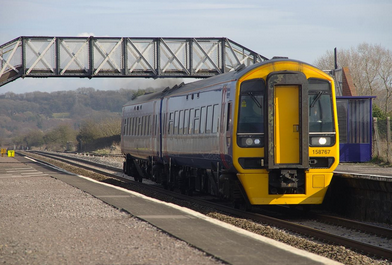
Pilning, near Bristol – only two trains per week, both from Cardiff Central on Saturdays only at 08:33 (to Penzance) and 14:33 (to Taunton). Formerly one train each way per week, but the bridge to the down platform was removed in November 2016.[15][16] Operated by Great Western Railway.
- Barry Links and Golf Street. From 19 May 2019, these stations are only served Monday-Saturday by the southbound 06:06 Arbroath to Dundee and 07:44 Arbroath to Edinburgh Waverley; northbound services are the 16:09 Glasgow Queen Street to Arbroath service (16:10 Saturday) and the 17:02 Edinburgh Waverley to Arbroath service (17:01 Saturday). Operated by Abellio ScotRail.
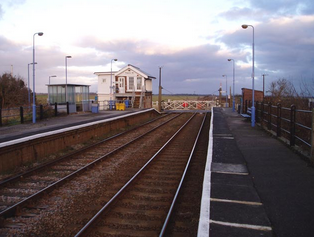
Shippea Hill and Lakenheath on the Breckland line to Norwich. Shippea Hill is served at 07:26 Mondays–Fridays (07:47 Saturday) eastbound (to Norwich) and 16:13 Saturdays only westbound (to Stansted Airport). Lakenheath, however, is served by seven trains on a Sunday (4 eastbound, 3 westbound). There are no services Monday–Friday and just a single journey in each direction on Saturdays (11:13 westbound, 15:49 eastbound). Both operated by Abellio Greater Anglia.
- Polesworth has one train per day Mondays–Saturdays, northbound only at 06:50. After major works on the West Coast Main Line, contractors neglected to replace the footbridge which they had removed, leaving passengers unable to access southbound trains. Operated by West Midlands Trains.
- Lelant Saltings, in Cornwall has been served by one train in each direction daily since the nearby Park & Ride facility was closed. Operated by Great Western Railway.
Bordesley is served by a single train on Saturdays only however, the station remains open for use when Birmingham City Football Club are playing at home when additional services call there. Operated by West Midlands Trains
In the mid-1990s British Rail was forced to serve Smethwick West in the West Midlands for an extra 12 months after a legal blunder meant that the station had not been closed properly. One train per week each way still called at Smethwick West, even though it was only a few hundred yards from the replacement Smethwick Galton Bridge.[17]
A full list of stations like the above are on Least Used Stations' website.[18]
5. Bustitution
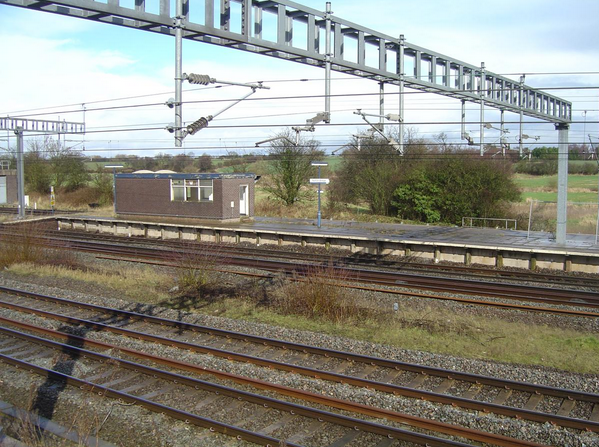
A variant of the parliamentary train service was the temporary replacement bus service, as employed between Watford and Croxley Green in Hertfordshire. The railway line was closed to trains in 1996, but to avoid the legal complications and costs of actual closure train services were replaced by buses, thus maintaining the legal fiction of an open railway.[19] The branch was officially closed in 2003. Work in track clearance commenced, beginning the work to absorb most of the route into a diversion of the Watford branch of the Metropolitan line into Watford Junction, but work was stopped in 2016 after a reassessment of likely costs and lack of agreement on funding.
The temporary replacement bus tactic was used from December 2008 between Ealing Broadway and Wandsworth Road[20] when Arriva CrossCountry withdrew its services from Brighton to Manchester, which was the only passenger service between Factory Junction, north of Wandsworth Road, and Latchmere Junction, on the West London Line. This service was later replaced by a single daily return train between Kensington Olympia and Wandsworth Road (as above) operated by Southern until formal consultation commenced and closure was completed in 2013.[21]
The replacement bus tactic was used to service Norton Bridge, Barlaston and Wedgwood stations on the Stafford–Manchester line, which had its passenger services withdrawn in 2004 to allow more Virgin CrossCountry and Virgin Trains West Coast services to be operated. Norton Bridge station was closed in December 2017 coinciding with the transfer of the West Midlands franchise from London Midland to West Midlands Trains, with funding for the bus service to Norton Bridge continuing until March 2019.[22][23]
References
- D.N. Smith (1988) The Railway and Its Passengers: A Social History, Newton Abbott: David & Charles
- MacDermott, E.T., History of the Great Western Railway, London: Great Western Railway, 1927, Vol. 1, part 2, page 640
- "The Reshaping of British Railways". Her Majesty's Stationery Office. 1963. http://www.railwaysarchive.co.uk/documents/BRB_Beech001a.pdf.
- "2V27 1102 South Ruislip to West Ealing". Real Train Times. Archived from the original on 10 December 2018. https://web.archive.org/web/20181206002544/http://www.realtimetrains.co.uk/train/C91486/2018/12/10/advanced. Retrieved 14 February 2019.
- "2M27 1147 West Ealing to High Wycombe". Real Train Times. Archived from the original on 6 October 2018. https://web.archive.org/web/20181206002950/http://www.realtimetrains.co.uk/train/C91485/2018/12/18/advanced. Retrieved 14 February 2019.
- "Passenger Train Services over Unusual Lines". Branchline.uk. http://www.branchline.uk/PSULintro.php. Retrieved 29 January 2018.
- The ghost trains of northern England that refuse to die The Independent 31 October 2017 https://web.archive.org/web/20171210090105/https://www.independent.co.uk/news/long_reads/ghost-train-routes-north-enland-lincolnshire-continue-gainsborough-cleethorpes-brigg-line-group-a8021656.html
- "2Y06 0550 London Victoria to Ashford International". Real Train Times. 14 February 2019. Archived from the original on 14 February 2019. https://web.archive.org/web/20190214092301/http://www.realtimetrains.co.uk/train/W04783/2019/01/02/advanced.
- Rural Railways – Fifth Report of the Session 2004–05, The Stationery Office, 9 March 2005, https://publications.parliament.uk/pa/cm200405/cmselect/cmtran/169/169ii.pdf, retrieved 16 September 2009
- Hearfield, Samuel (15 October 2016). "Chester to Liverpool South Parkway (Parliamentary Train) Via the Halton Curve (Final Trip, 16th of July 2016)". Samuel Hearfield (YouTube). https://www.youtube.com/watch?v=4Je-jQpVhEw. Retrieved 17 November 2016.
- New Chester to Liverpool rail service delayed due to shortage of trains Cheshire Live 21 September 2018 https://www.cheshire-live.co.uk/news/chester-cheshire-news/new-chester-liverpool-rail-service-15184218
- 2V27 1057 South Ruislip to London Paddington Real Train Times 7 December 2018 https://web.archive.org/web/20181205074713/http://www.realtimetrains.co.uk/train/C72036/2018/12/07/advanced
- 2M29 1135 London Paddington to High Wycombe Real Train Times 7 December 2018 https://web.archive.org/web/20181205074909/http://www.realtimetrains.co.uk/train/C71972/2018/12/07/advanced
- "Rail buffs to highlight Teesside Airport 'ghost station'". The Journal. Trinity Mirror. 14 October 2009. Archived from the original on 26 October 2009. https://www.webcitation.org/5kox36iSU.
- "All aboard for the ghost train". Western Daily Press. 10 August 2006.
- Pilning Station Footbridge Removed for Wiring Modern Railways issue 819 December 2016 page 11
- "Smethwick West Station 1867–1996". railaroundbirmingham.co.uk. http://www.railaroundbirmingham.co.uk/Stations/smethwick_west.php. Retrieved 16 September 2009.
- "Least Used Stations - The Stations". https://leastusedstations.wixsite.com/leastusedstations/the-stations.
- "Croxley Green LNWR branch – passenger closure". Rail Chronology. http://www.railchronology.free-online.co.uk/Croxley%20Green%20branch.htm. Retrieved 29 January 2018.
- "'Ghost bus' makes final journey"itv.com news article 11 June 2013; Retrieved 20 May 2013 http://www.itv.com/news/london/update/2013-06-11/the-end-of-the-road-for-the-ghost-bus/
- "Consultation: Withdrawal of scheduled passenger services between Wandsworth Road, Kensington (Olympia) and Ealing Broadway". Department for Transport. 10 May 2012. https://www.gov.uk/government/consultations/withdrawal-of-scheduled-passenger-services-between-wandsworth-road-kensington-olympia-and-ealing-broadway. Retrieved 3 July 2012.
- Norton Bridge rail station: proposed closure Department for Transport 6 November 2017 https://web.archive.org/web/20181206200024/https://www.gov.uk/government/consultations/norton-bridge-station-closure
- Closure Ratification Notice – Norton Bridge Station Office of Rail & Road 26 October 2017 http://orr.gov.uk/__data/assets/pdf_file/0009/25875/norton-bridge-closure-ratification-notice.pdf




